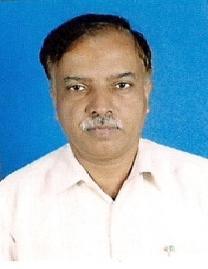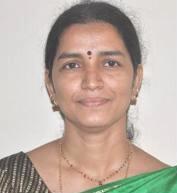A Profile
The study of Dravidian Culture, which includes all aspects of life and History is the prime objective of the Dravidian University. The study of culture of a society cannot be completed without the study of folklore, because, folklore touches all aspects of the life of a given society. Hence the Department of Folklore and Tribal Studies is the prime limb of the Dravidian University which serves for the main purpose of the Dravidian University.
The Structure of the Department:
TThe Department of Folklore and Tribal Studies was established in September 2003 and became fully functional from the academic year 2004-05. The Government of Andhra Pradesh has sanctioned the posts of 1 Professor 2 Associate Professors 4 Assistant Professors for the Department. Presently 1 Professor, 3 Assistant Professors are working and 2 Associate Professors and 1 Assistant professors posts fell vacant, as some of the recruited persons left the Department and they are to be filled. The Department of Folklore and Tribal Studies in Dravidian University has been established with the chief objective of conducting an advanced level research in Folklore and Tribal Studies with a comparative approach on folklore of various social groups in the area of Dravidian languages, spreading across South India and also to make a comprehensive study of folklore and folk life, social system of Tribes in the geographical area of Dravidian languages. The Department has been making sincere efforts towards these objectives; conducting the research on folklore of Telugu, Kannada, Tamil and Malayalam. The structure of the faculty of the Department was designed as a multidisciplinary one and faculty are chosen from multilingual backgrounds to enable the Department to do research of the folklore in Telugu, Tamil, Kannada and Malayalam. The Faculty members came from Literature, History, Anthropology and Sociology back grounds. A Folklore Department should be mentioned as a Special Department. Because there are only 10 Folklore Departments across India among 500 Universities.
Faculty :
| |
|
|
|
 |
Name
Qualification
Designation
Specialization
E-Mail
Contact Number
Bio-data |
:
:
:
:
:
:
:
|
Prof. M.N.Venkatesha
M.A., M.Phil., Ph.D.
Professor & Dean
-----
mnvkuppam@gmail.com
07382753182
Click here to Download
|
| |
|
|
|
 |
Name
Qualification
Designation
Specialization
E-Mail
Contact Number
Bio-data |
:
:
:
:
:
:
: |
Prof. K.Shyamala
M.A(His.)., M.A(Women Studies).M.Ed., M.A(Sociology)., M.Phil.(His.)., Ph.D(His.). UGC-NET(History) for twice
Professor & Head
Tribal Studies, Folklore & Social History
shyamala.du@gmail.com
94409 26992
Click here to Download |
| |
|
|
|
| |
|
|
|
Programs Offered
| Name of the course |
Intake |
| M.A., |
| Ph. D., & M.Phil., (Part-time & Full-Time) |
|
20 |
Research Projects Completed
SI. No. |
Dated |
Title of the Project |
Sponsored by |
Prof. P. Subbachary |
-
|
|
The Cult of Mahabharata |
Dravidian University |
-
|
|
The Jambapurana |
National Folklore Support Centre, Chennai |
-
|
|
UGC-MRP – Dynamics of Telugu Folk tales |
University Grants Commission, New Delhi |
-
|
|
The Epic of Mallanna |
IGNCA New Delhi |
Prof. B. Krishna Reddy |
-
|
|
The Case of Yanadi Tribal |
Dravidian University |
-
|
19-2-2007 |
We Sing for our Patrons: The Case of Thoti of Adilabad District, Andhra Pradesh |
Tribal Cultural Research & Training Institute, Dept. of Tribal Welfare, Govt. of A.P. Hyderabad. |
-
|
19-2-2007 |
The Naikpod of A.P. An Ethnographic Account |
-
|
18-6-2007 |
Rapid Assessment of the existing situation of the Sugali in Anantapur District, Andhra Pradesh |
-
|
12-11-2007 |
Folk lore & Folk life of the Kulia |
-
|
12-11-2007 |
Tradition & Continuity Among the Valmiki of Agency Areas of A.P |
-
|
21-7-2008 |
An interface between Ecology and Economy of the Andh |
-
|
21-7-2008 |
Towards Empowering of the Challa Yanadis of Nellore & Chittoor Districts, Andhra
Pradesh |
-
|
07-01-2010 |
UGC-MRP - The Cult of Sai Baba of Shirdi and its Diffusion in Dravidian Culture |
University Grants Commission, New Delhi |
Dr. M.N. Venkatesha |
-
|
2004 |
Impact of Inclusive Education on Tribal Kids |
Government of Karnataka, SSA |
-
|
2007 |
Epic of Mailara Linga- Documentation |
National Folklore Support Centre, Chennai |
-
|
2007 |
Folk Imagery |
Dravidian University |
-
|
2009 |
Folk Epics and Epic Narrators of Karnataka, Socio Economic Issues |
UGC |
Dr. K. Shyamala |
-
|
2008 |
Vanishing Nomadism: The Saga of the Dommara |
Dravidian University |
-
|
2011 |
Social Sub-Groups and The Cultural Habitus: A Folkloristic and Historical Study of Social Cultural Formations of Castes and Tribes in Tri-Lingual Dravidian Region of Kuppam. |
UGC Major Research Project. |
Seminars and Workshops Organized
SI. No. |
Year |
Title |
Convener |
1. |
2004 |
XIII Annual Conference of FOSSILS
‘Dravidian Folklore: A Comparative Approach’
(23-25 September 2004 |
Prof. P. Subbachary |
2. |
2005 |
Folk Narrative and Social Identity
(4-6 March 2006) |
Prof. P. Subbachary |
3. |
2006 |
Denotified, Nomadic and Semi-Nomadic Tribes : Issues and Perspectives (3-4 November, 2006) |
Prof. B. Krishna Reddy |
4. |
2006 |
Intangible Cultural Heritage of Andhra Pradesh
(14-17 Nov., 2006) |
Prof. B. Krishna Reddy |
5. |
2007 |
Folk Performing Arts vis-à-vis Globalization
(22-23 August, 2007) |
Prof. B. Krishna Reddy |
6. |
2008 |
32nd Session of Indian Folklore Congress
‘Folklore and Indian Social Discourse’
(18-20 December 2008) |
Prof. P. Subbachary |
7. |
2008 |
Folklore Outreach Through Media and Tourism
(2-4 April 2008) |
Dr. M.N. Venkatesha |
8. |
2009 |
Preservation of Manuscripts and Reading of Palm Leaf Scripts
( 20-22 November 2009) |
Dr. M.N. Venkatesha |
9. |
2009 |
The Making of the Dictionary of South Indian Folklore
(14-15 July 2009) |
Prof. P. Subbachary |
10. |
2010 |
Workshop on Encyclopedia of South Indian Folklore |
Prof. P. Subbachary |
12. |
2010 |
UGC- Refresher Course on Research Methodology in Folkloristics form 04th to 24th February, 2010 |
Prof. B. Krishna Reddy |
13. |
2010 |
National Folklore Conference of FOSSILS
(8-10th April, 2010) |
Prof. B. Krishna Reddy |
14. |
2011 |
ICSSR - Training Course on Research Methodology in Folkloristics
for ten days from 31st January, 2011 to 09th March, 2011 |
Prof. B. Krishna Reddy |
15. |
2012 |
Dravidian Poetry and Sypnperium (21-22 August 2012) |
Prof. P. Subbachary |
16. |
2014 |
International Seminar to be held July 24th to 26th |
Dr. M.N. Venkatesha |
The Encyclopedia of South Indian Folklore:
The Encyclopedia of South Indian Folklore is a prestigious project completed by the Department. It is a joint project of Kannada University Humpi and the Dravidian Unviersity Kuppam. The Kannada University prepared the folklore material of Kannada and Malayalam and the Dravidian University prepared the Telugu and Tamil material and took the responsibility of editing the material they collected. More than one hundred scholars across South Indian participated in this program and authored entries. Two hundred and fifty entries, encompassing all aspects of folklore of respective area of the folklore or each language are selected and average 270 pages of material of each language Telugu, Tamil, Kannada and Malayalam are prepared in this encyclopedia. All the entries with illustrations are arranged in alphabetical order across languages. Finally a list of entries for quick reference is given at the end. A list of scholars contributed is also included at the end of the book. Thus the Encyclopedia of South Indian Folklore came out as a prestigious and a practical ready reckoner book for the scholars who are working in South Indian Folklore. The Kannada Version of the book is published by the Kannada University Humpi and the Telugu Version is published by the Dravidian University. Presently both the universities came to an understanding to publish this prestigious work in English and the work is on.
Desi Siri: The South Indian Folklore Museum and Archives:
The Department made a modest attempt for the establishment of Folklore museum and archiveS the year 2004. The Pioneering Indian Folklorist Prof. B.Ramaraju inaugurated the Folk museum with around 50 objects. At first we collected domestic material and Agricultural implements around 40 villages in Kuppam region. We continued our work of collection in some of the villages of Karnataka and Tamilnadu bordering Kuppam. In the year 2005, the University expanded the scope of Folk Museum by allocating five acres of land for the Museum. Two small buildings with ACC roof, resembling village architecture are constructed. These two buildings could accommodate 200 objects collected for museum, which include some folk musical instruments. Chittoor district is well known for the worship of Goddess Draupadi. A big number of temples of Draupadi or Pandavulu are coming from centuries in the tri - junction of Karnataka, Andhra Pradesh and Tamil Nadu. Keeping this in view, an induced temple of Draupadi and a Mother Goddess image opposit to Pothuraju image are installed in the Folk Museum complex. This ambience of Folk museum is named after DESI SIRI literally ‘wealth of the country ’. Now the Folk Museum complex completely resembles a village and reflects the folk culture. The Folk Museum has been constantly accumulating with folk objects from the field work collections of the Faculty.
Folk Archives:
Archives is also functioning as a part of Folklore museum and it is nothing but accumulation of audio visual material collected from the field work of the Department Faculty. Five hundred hours of digital video documentation of various folk forms of South Indian Languages is available in these archives. More than Ten thousand photos reflecting folklore, folk life and folk religion of South India are also accumulated. The Palanadu Festival, The Jamba Puranam performance, Sasuvula Chinnamma Katha, Kuppam Ganga Jathara are some of the very valuable ethnographic documents that are included in this archives.
Other Achievements:
Organization of World Folklore Day, Folk Festivals: The word “Folklore” was coined for the subject as a technical term by William J. Thomas first time on 22 August 1846. The Day 22 August is celebrated as World Folklore Day in many countries. The Department of Folklore and Tribal Studies has started the World Folklore Day Celebration from 2005 and have been celebrating till the before last year. The folklore day celebration has become a big cultural event in the entire state. It was reported at national level news. The entire university community participates in this celebration. A two day folk festival is conducted on this day. Many folk performers perform their traditional performances on these two days from entire South India. Hundreds of spectators participate in this two day festival every year. It is not only al colorful festival but also a socially significant event as the traditional folk food is supplied to all of the participants and to the spectators. Finally at the end of the two day festival many prominent folk performers are felicitated. The event is a ‘never forgettable event’ on the one side to the performers on the other side to all spectators. The Departments has documented all folk performances every year.
Fieldwork Programmes:
The faculty of the Department is seriously engaged in field-research of various folk expressive genres. Every year they conduct fieldwork as part of their ongoing projects and other academic activities. They interview many folk performers and document folk performances on audio-visual devices and archive the same. It is a rich experience to the faculty and the documents are valuable for posterity.
For any kind of consultation, may be contacted below:
1. shyamala.du@gmail.com
